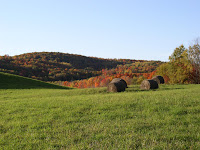
The rooster is crowing, cracking through thick layers of sleep. The kids call him “Brooster.” Guests at the farm call him “Dinner.” He seems to think that everyone needs waking up all the time. At this moment, at least, he is right.
The next sound I hear are steps going down the stairs, plodding into the kitchen. The milk bucket clangs. It is Jordan. He will be pleased to be down there first, gathering his supplies, and out to milk his cow, Daisy. He loves to milk—by hand, twice a day, ever since Daisy gave birth to Dandelion in March. Who knew that was in my genes? I roll out of bed to be downstairs when he returns. There will be milk to process.
I open the refrigerator and pull out the stainless steel pot where last night’s milk is separating. With a large spoon, I skim the skin that has formed on top. Golden folds of thick cream slide into a waiting quart jar. We will use the cream for cream, ice cream, butter; and the remaining milk for drinking, and making yogurt and cheese. This is step one.
I muse. Jordan is two-handedly securing our Dairy Independence, or rather, he is cementing our Daisy Dependence. For nothing now tastes as good as the sweet substance she provides. Her milk is living, luminous. It practically glows, like the liquid sunshine it is: sun-fed grass-made nutrients transformed into a sweet protein rich elixir. Talk about miracles.
I pour the remaining milk into waiting bottles and wash my first pot of the day. Jordan enters with the usual gallon and a half. Milk anyone?

Being here is different than I imagined. When we decided to move over three years ago, we wanted land. It was incidental to us that this place had been a farm. We are artists, not farmers—makers of culture, not agriculture. We wanted to do our work in closer relationship with the natural world; we wanted to generate art and ideas that remain faithful to the earth in us and around us. But farming? Thanks anyway. A vegetable garden perhaps, but that would be it.
Think again. A first “aha” moment came several months into our experiment. By then we had learned more about the history of our farm, and the three generations of one family who had produced potatoes then milk then beef. We had begun to appreciate how much of the beauty of this area—its wide green vistas and tree covered hills—was due to a light agricultural touch.

The realization dawned: Farming is not just about producing food. It is about participating in the endless, ongoing pro/creativity of the earth—soil, air, fire, water becoming plant, animal, human and back again. Farming is a relationship to the natural world. Perhaps even the relationship to the natural world that Geoff and I were yearning for to fund our arts and ideas. We realized that we want more than simply to bear witness to the cycles of the natural world, we want to be those cycles, to move with them, to co-create with them, making this world what it is and can be. The fact is we humans are part and parcel of what is. Farming is a way of knowing concretely that this is true.

The animal count started to rise. First chickens, ducks, and then a cow. A second revelation soon followed. Farming is not just about our relationship to the land. It is about our relationships with each other too.
In our culture and many others, farming has traditionally been a family affair. Before the shift from sun-based to fossil-fuel based farming (a shift whose implications Michael Pollan documents brilliantly in his must-read Sunday Times article, “Farmer in Chief”), farming was what a family did to ensure its survival. A farm wasn’t (just) a unit of agricultural production, it was a community of people in which the well being of every member depended on and enabled the well being of every other member. It was a community in which work and play, art and life, career and kids entwined in mutually-enabling synergies. The farm made the family who made the farm.
Insight flashed: We are a farm family. That is who we have always been and who we want to be.
It all began to make sense. Sure, we moved here with plans for the farm, but the farm had plans for us too. The farm is working through us to create us into the network of persons and relationships it needs to thrive. We are learning about love.
Ever since, we have been open to learning, and learn we have. We are learning what we need to know to take care of plants, animals, and acres of land, but we are also learning about the perspectives that doing so provides on the values, trends, and ideals that dominate contemporary western culture. Nothing more or less than a radical new philosophy of living is emerging here—one inspired by a duck, a rooster, two cats, three cows, four hens, four children, and a horse named Marvin.
Next Week: Farm philosophy



No comments:
Post a Comment